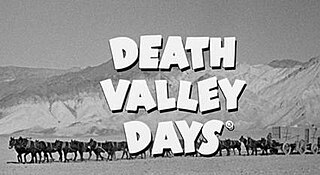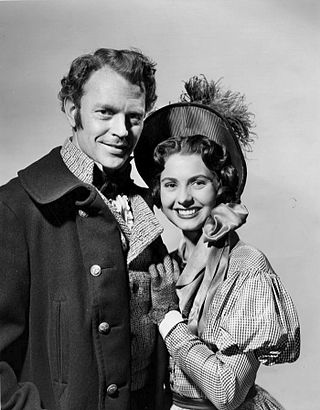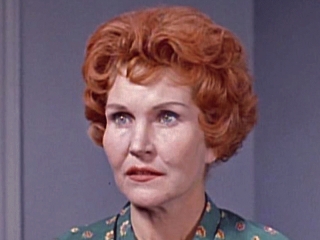Related Research Articles
A television film, alternatively known as a television movie, made-for-TV film/movie, telefilm, telemovie or TV film/movie, is a feature-length film that is produced and originally distributed by or to a television network, in contrast to theatrical films made for initial showing in movie theaters, and direct-to-video films made for initial release on home video formats. In certain cases, such films may also be referred to and shown as a miniseries, which typically indicates a film that has been divided into multiple parts or a series that contains a predetermined, limited number of episodes.
The following is the 1961–62 network television schedule for the three major English language commercial broadcast networks in the United States. The schedule covers primetime hours from September 1961 through April 1962. The schedule is followed by a list per network of returning series, new series, and series cancelled after the 1960–61 season.
The following is the 1976–77 network television schedule for the three major English language commercial broadcast networks in the United States. The schedule covers primetime hours from September 1976 through August 1977. The schedule is followed by a list per network of returning series, new series, and series cancelled after the 1975–76 season. All times are Eastern and Pacific, with certain exceptions, such as Monday Night Football.

Death Valley Days is an American Western anthology series featuring true accounts of the American Old West, particularly the Death Valley country of southeastern California. Created in 1930 by Ruth Woodman, the program was broadcast on radio until 1945. From 1952 to 1970, it became a syndicated television series, with reruns continuing through August 1, 1975. The radio and television versions combined to make the show "one of the longest-running Western programs in broadcast history."

Naked City is an American police procedural television series from Screen Gems that aired on ABC from 1958 to 1963. It was inspired by the 1948 motion picture The Naked City and mimics its dramatic "semi-documentary" format. As in the film, each episode concluded with a narrator intoning the iconic line: "There are eight million stories in the naked city. This has been one of them."
The following is the 1958–59 network television schedule for the four major English language commercial broadcast networks in the United States. The schedule covers primetime hours from September 1958 through March 1959. The schedule is followed by a list per network of returning series, new series, and series cancelled after the 1957–58 season.
The following is the 1957–58 network television schedule for the four major English language commercial broadcast networks in the United States. The schedule covers primetime hours from September 1957 through March 1958. The schedule is followed by a list per network of returning series, new series, and series cancelled after the 1956–57 season.

Four Star Playhouse is an American anthology series that ran from September 25, 1952, through September 27, 1956.
The following is the 1952–53 network television schedule for the four major English language commercial broadcast networks in the United States. The schedule covers primetime hours from September 1952 through March 1953. The schedule is followed by a list per network of returning series, new series, and series cancelled after the 1951–52 season.

Schlitz Playhouse of Stars is an anthology series that was telecast from 1951 until 1959 on CBS. Offering both comedies and drama, the series was sponsored by the Joseph Schlitz Brewing Company. The title was shortened to Schlitz Playhouse beginning with the fall 1957 season.

Ford Theatre, spelled Ford Theater for the original radio version and known, in full, as The Ford Television Theatre for the TV version, is a radio and television anthology series broadcast in the United States in the 1940s and 1950s. At various times the television series appeared on all three major television networks, while the radio version was broadcast on two separate networks and on two separate coasts. Ford Theatre was named for its sponsor, the Ford Motor Company, which had an earlier success with its concert music series, The Ford Sunday Evening Hour (1934–42).

A television show, TV program, or simply a TV show, is the general reference to any content produced for viewing on a television set that is traditionally broadcast via over-the-air, satellite, or cable. This includes content made by television broadcasters and content made for broadcasting by film production companies. It excludes breaking news, advertisements, or trailers that are typically placed between shows. Television shows are most often scheduled for broadcast well ahead of time and appear on electronic guides or other TV listings, but streaming services often make them available for viewing anytime. The content in a television show is produced by one of two production methodologies: live taped shows such as variety and news magazine shows shot on a television studio stage or sporting events The other production model includes animation and a variety of film productions ranging from movies to series. Shows not produced on a television studio stage are usually contracted or licensed to be made by appropriate production companies.
Out There is a science fiction television program that was broadcast on Sundays at 6:00 p.m. EST on CBS Television from October 28, 1951 through January 13, 1952. It was one of the first science fiction anthology series, and one of the first shows to mix filmed special effects with live action. It only lasted twelve half-hour episodes before being cancelled. The awkward time slot may have led to its failure. In its short run, the program featured episodes adapted from stories by authors including Robert A. Heinlein, Ray Bradbury, Theodore Sturgeon, John D. MacDonald, Murray Leinster, Frank Belknap Long and Milton Lesser. After its initial cancellation, there was at least one report that the network planned on reviving it, but this did not happen.
Alcoa Premiere is an American anthology drama series sponsored by the Alcoa Corporation that aired from October 10, 1961, to September 12, 1963, on ABC. The series was hosted by Fred Astaire, who also starred in several of the episodes.
Public Prosecutor is an American television series produced in 1947–1948, which first aired in 1951.

Startime is an anthology show of drama, comedy, and variety, and was one of the first American television shows broadcast in color. The program was aired Tuesday nights in the United States on the NBC network in the 1959–60 season.
Gruen Playhouse is an American dramatic anthology series that was known as Gruen Guild Playhouse when it debuted on ABC on September 27, 1951. "Guild" was dropped from the title when it was shown on the DuMont Television Network from January 17, 1952, until July 3, 1952.
Magnavox Theatre is an American television anthology of comedies and dramas that aired seven hour-long episodes on CBS in 1950, alternating weekly with Ford Theatre. The first episodes were live, with filmed episodes later on. Episode six, according to CBS, was the first hour-long film made in Hollywood specifically for television. The film was made by Hal Roach Studios Inc., which also made "The Hurricane at Pilgrim Hill", which was the seventh and final episode, scheduled for broadcast on December 8, 1950.
Sure as Fate is a 60-minute American anthology mystery drama series that aired on CBS from July 4, 1950, until April 3, 1951.
Hollywood Opening Night is an American anthology television program that was broadcast on CBS in 1951-1952 and on NBC in 1952-1953. The NBC version was the first dramatic anthology presented live from the West Coast. Episodes were 30 minutes long.
References
- ↑ McNeil, Alex (1996). Total Television: the Comprehensive Guide to Programming from 1948 to the Present (4th ed.). New York, New York: Penguin Books USA, Inc. p. 752. ISBN 0-14-02-4916-8.
- 1 2 3 Brooks, Tim; Marsh, Earle (1999). The Complete Directory to Prime Time Network and Cable TV Shows 1946-Present (7th ed.). New York: The Ballentine Publishing Group. pp. 913–914. ISBN 0-345-42923-0.
- ↑ Billboard. Nielsen Business Media, Inc. 1993-06-12. p. 9. ISSN 0006-2510 . Retrieved 2014-10-24.